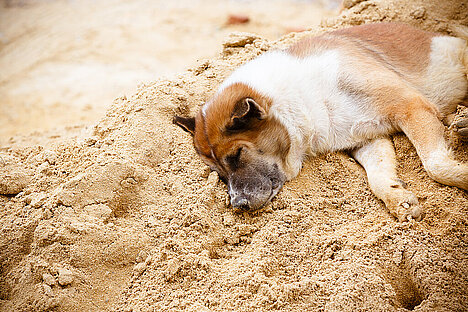Unconsciousness

Unconsciousness is a condition in which a dog no longer responds to stimuli and shows no normal bodily functions. This can have various causes, such as shock, cardiac arrest, poisoning or a stroke. Unconsciousness is a life-threatening emergency and requires immediate action.
How do I know if my dog is unconscious?
To determine whether your dog is unconscious, you need to carry out a few simple tests. For example, you can try talking to him, calling his name or shaking him gently. If he doesn't respond, you can lift his eyelids and see if his pupils react to light. If they do not constrict or dilate, this is a sign of unconsciousness. You can also check his heartbeat and breathing by placing your hand on his chest or putting an ear to his mouth. If you can't feel or hear a heartbeat or breathing, your dog is unconscious.
What should I do if my dog is unconscious?
If your dog is unconscious, you should follow these steps:
- Call a veterinarian immediately or take your dog to the nearest veterinary clinic.
- Check your dog's airway and remove any foreign objects from its mouth.
- Lay your dog on a flat surface and stretch out his neck to facilitate breathing.
- Perform cardiopulmonary resuscitation (CPR) if your dog has no heartbeat or is not breathing. To do this, press on his chest with both hands about 100 to 120 times per minute and breathe air into his nose every five seconds. Repeat this until your dog regains consciousness or the vet arrives.
- Keep your dog warm and calm him with a gentle voice.
How can I prevent unconsciousness in my dog?
Unconsciousness in dogs cannot always be prevented, but there are some steps you can take to reduce the risk. These include:
- Keep your dog away from toxic substances and make sure they don't eat or drink anything that could harm them.
- Have your dog regularly examined and vaccinated by a vet.
- Provide your dog with a balanced diet and sufficient exercise.
- Avoid extreme temperatures and heat stress for your dog.
- Recognize the signs of stress or anxiety in your dog and try to reduce them.
Unconsciousness in dogs is a serious condition that requires quick action. If you recognize the symptoms and know how to help your dog, you can increase his chances of survival and save his life.
The authors assume that a veterinarian should be consulted if an animal is ill and that medication should only be taken after consultation with a doctor or pharmacist. Only an individual examination can lead to a diagnosis and treatment decision.
We help you find the nearest vet → This way